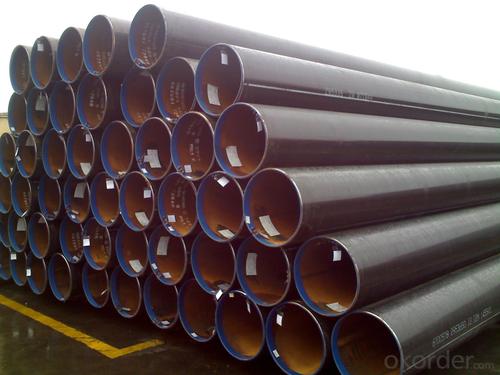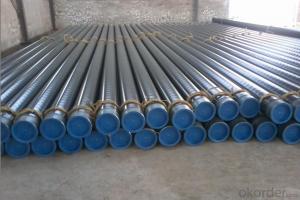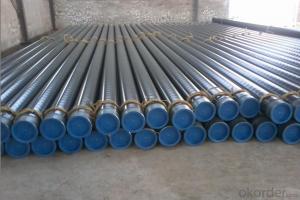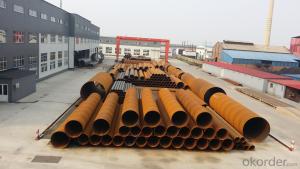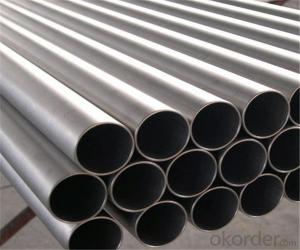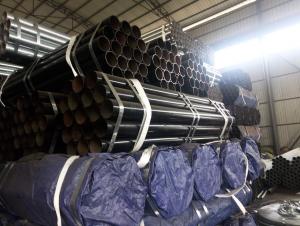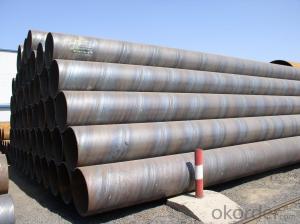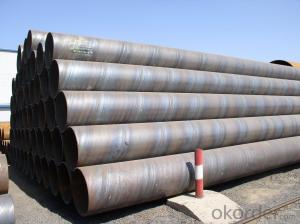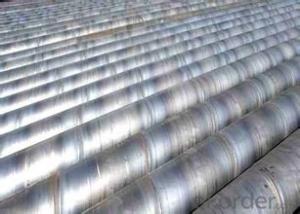SSAW welded carbon steel pipes from cnbm
- Loading Port:
- Tianjin
- Payment Terms:
- TT or LC
- Min Order Qty:
- 50 m.t.
- Supply Capability:
- 20000 m.t./month
OKorder Service Pledge
OKorder Financial Service
You Might Also Like
1、Structure of Q235 Large Diameter SSAW Spiral Welded Carbon Steel Pipe or Tubes:
High strength ERW PIPE, OIL CASING PIPE , LINE PIPE , STRUCTURE PIPE ,SSAW/HSAW PIPE and ANTICORROSIVE and INSULATED PIPE ect.Now we have 5 production lines of SSAW steel pipe, 2lines of ERW steeel pipe.
2、Main Features of Q235 Large Diameter SSAW Spiral Welded Carbon Steel Pipe or Tubes:
• High manufacturing accuracy
• High strength
• Small inertia resistance
• Strong heat dissipation ability
• Good visual effect
• Reasonable price
3、Q235 Large Diameter SSAW Spiral Welded Carbon Steel Pipe or TubesSpecification:
Standard | GB, DIN, ASTM ASTM A106-2006, ASTM A53-2007 |
Grade | 10#-45#, 16Mn 10#, 20#, 45#, 16Mn |
Thickness | 8 - 33 mm |
Section Shape | Round |
Outer Diameter | 133 - 219 mm |
Place of Origin | Shandong, China (Mainland) |
Secondary Or Not | Non-secondary |
Application | Hydraulic Pipe |
Technique | Cold Drawn |
Certification | API |
Surface Treatment | factory state or painted black |
Special Pipe | API Pipe |
Alloy Or Not | Non-alloy |
Length | 5-12M |
Outer Diameter | 21.3-610mm |
Grade | 20#, 45#, Q345, API J55, API K55, API L80, API N80, API P110, A53B |
Standard | ASME, ASTM |
1) Material:20#(ASTM A 106/A53 GRB.API5LGRB,GB),45#,16Mn,10#.
2) Specification range:OD:21.3-610mm,WT:6-70mm,length:6-12m or according to the requirement of clients.
3) Excutive standards:GB,ASME API5L.ASTM A 106/A53,Despite of the above standards,we can also supply seamless steel pipe with standard of DIN,JIS,and so on,and also develop new products according to the requirements of our clients!
4) Surface:black lacquered,varnish coating or galvanized.
5) Ends:Beveled or square cut,plastic capped,painted.
6) Packing:bundles wrapped with strong steel strip,seaworthy packing.
4、Packaging & Delivery
Packaging Details: | seaworthy package,bundles wrapped with strong steel strip |
Delivery Detail: | 15-30days after received 30%TT |
5、FAQ of Q235 Large Diameter SSAW Spiral Welded Carbon Steel Pipe or Tubes:
①How is the quality of your products?
Our products are manufactured strictly according to national and internaional standard, and we take a test
on every pipe before delivered out. If you want see our quality certifications and all kinds of testing report, please just ask us for it.
Guaranteed: If products’ quality don’t accord to discription as we give or the promise before you place order, we promise 100% refund.
②How about price?
Yes, we are factory and be able to give you lowest price below market one, and we have a policy that “ for saving time and absolutely honest business attitude, we quote as lowest as possible for any customer, and discount can be given according to quantity”,if you like bargain and factory price is not low enough as you think, just don’t waste your time.Please trust the quotation we would give you, it is professional one.
③Why should you chose us?
Chose happens because of quality, then price, We can give you both.Additionally, we can also offer professional products inquiry, products knowledge train(for agents), smooth goods delivery, exellent customer solution proposals.Our service formula: good quality+good price+good service=customer’s trust
SGS test is available, customer inspection before shipping is welcome, third party inspection is no problem.
6、Q235 Large Diameter SSAW Spiral Welded Carbon Steel Pipe or Tubes Images:
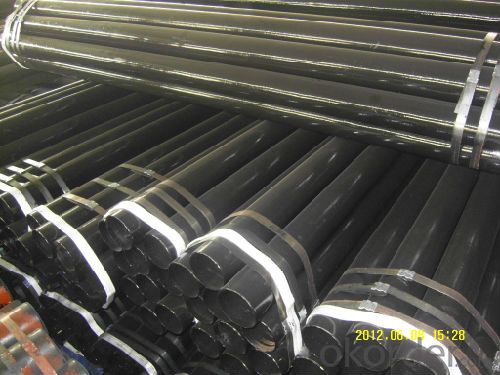
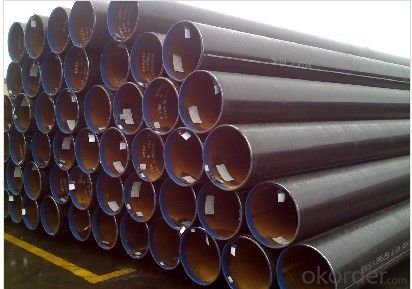
- Q: What are the different methods of repairing damaged steel pipes?
- There are several methods of repairing damaged steel pipes, including welding, epoxy lining, pipe bursting, and pipe relining. Welding involves joining the damaged sections of the pipe together using heat, while epoxy lining involves applying a protective coating to the inner surface of the pipe. Pipe bursting involves replacing the damaged pipe with a new one by pulling it through the existing pipe, and pipe relining involves inserting a new liner into the damaged pipe to create a new, seamless pipe within the existing one. The choice of method depends on factors such as the extent of damage, accessibility, and cost-effectiveness.
- Q: How to establish a concrete-filled steel tubular column model in ANSYS?
- First, you have to choose at least three or more types of materials. Modeling is a little complicated. Strongly recommended that the landlord to see "ANSYS in civil engineering applications", where there is such an example, you step by step, step by step back, and then in accordance with their own requirements modeling, OK. Wish you success
- Q: Can steel pipes be used for pharmaceutical manufacturing?
- Yes, steel pipes can be used for pharmaceutical manufacturing. Steel pipes are commonly used in various industries, including pharmaceutical manufacturing, due to their durability, strength, and resistance to corrosion. In pharmaceutical manufacturing, steel pipes are primarily used for fluid transportation, such as the transfer of chemicals, solvents, and other raw materials. They are also used for the distribution of process water, steam, and other utilities. Stainless steel pipes are particularly preferred in pharmaceutical manufacturing as they are highly resistant to corrosion and can withstand high temperatures and pressures. Moreover, stainless steel pipes have smooth surfaces, which prevent the accumulation of particles and facilitate easy cleaning and sterilization, essential requirements in pharmaceutical production. Overall, steel pipes are a reliable and suitable option for pharmaceutical manufacturing due to their robustness, resistance to corrosion, and ability to meet the stringent cleanliness and hygiene standards of the industry.
- Q: Can steel pipes be used for stormwater management systems?
- Yes, steel pipes can be used for stormwater management systems. Steel pipes are commonly used in stormwater management systems due to their durability, strength, and resistance to corrosion. They can efficiently handle the flow of stormwater and are suitable for underground installation, making them a reliable choice for managing stormwater runoff.
- Q: Can steel pipes be used for conveying corrosive substances?
- When conveying corrosive substances, it is crucial to select the appropriate type of steel and take additional protective measures. For instance, stainless steel pipes offer excellent resistance to corrosion and can handle a wide range of corrosive substances. However, one must carefully consider the specific corrosive properties and concentration levels of the substance being conveyed. In certain cases, applying additional protective coatings or linings may be necessary to prevent corrosion and guarantee the pipes' durability. Regular maintenance and inspection play a vital role in identifying and addressing any signs of corrosion to avoid leaks or failures in the piping system. In conclusion, while steel pipes are suitable for conveying corrosive substances, proper material selection, protective measures, and maintenance are essential for safe and efficient operations.
- Q: Can steel pipes be used for underground drainage systems?
- Yes, steel pipes can be used for underground drainage systems.
- Q: Can steel pipes be painted?
- Yes, steel pipes can be painted. The process typically involves cleaning and preparing the surface, applying a primer, and then using a suitable paint or coating to achieve the desired finish.
- Q: How are steel pipes used in the mining industry?
- Steel pipes are widely used in the mining industry for various purposes such as transporting water, slurry, and other fluids, as well as for ventilation and structural support in underground mines. Their durability, resistance to corrosion, and high pressure capacity make them ideal for these applications.
- Q: What is the difference between steel pipes and concrete-lined pipes?
- The main difference between steel pipes and concrete-lined pipes lies in their composition and structural properties. Steel pipes are primarily made of steel, which provides strength, durability, and resistance to corrosion. On the other hand, concrete-lined pipes are steel pipes that have been coated with a layer of concrete. This concrete lining adds an extra layer of protection against corrosion and also provides additional structural stability. Concrete-lined pipes are commonly used in applications where protection against corrosion and abrasion is crucial, such as in water distribution systems or sewage pipelines. In contrast, steel pipes are often used in various industries where strength and durability are vital, such as oil and gas pipelines or structural applications.
- Q: Can steel pipes be used for LNG terminals?
- Yes, steel pipes can be used for LNG terminals. Steel pipes are commonly used in the construction of LNG terminals due to their durability, strength, and resistance to extreme temperatures. Additionally, steel pipes can effectively handle the high-pressure requirements of LNG transportation and storage.
Send your message to us
SSAW welded carbon steel pipes from cnbm
- Loading Port:
- Tianjin
- Payment Terms:
- TT or LC
- Min Order Qty:
- 50 m.t.
- Supply Capability:
- 20000 m.t./month
OKorder Service Pledge
OKorder Financial Service
Similar products
Hot products
Hot Searches
Related keywords


